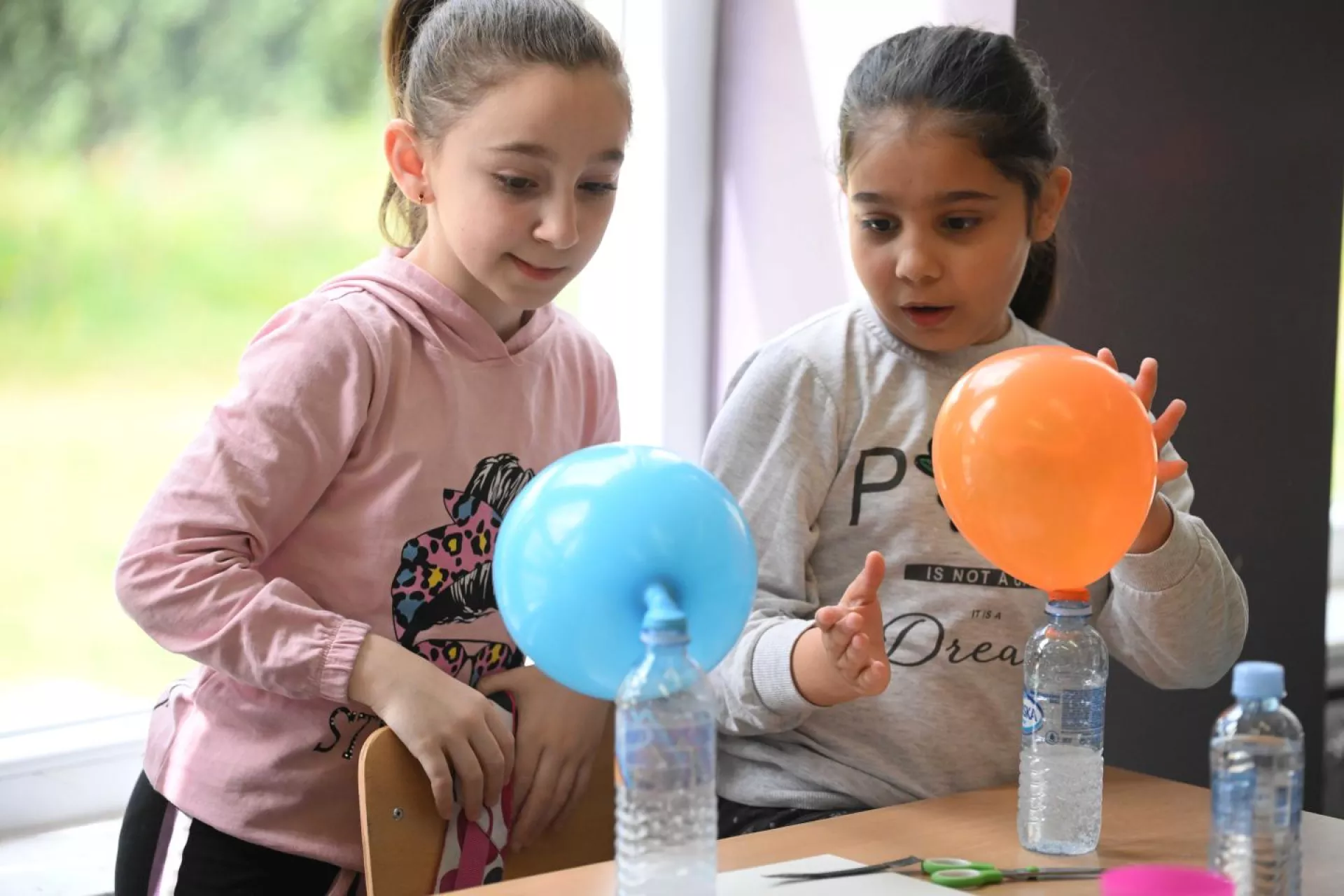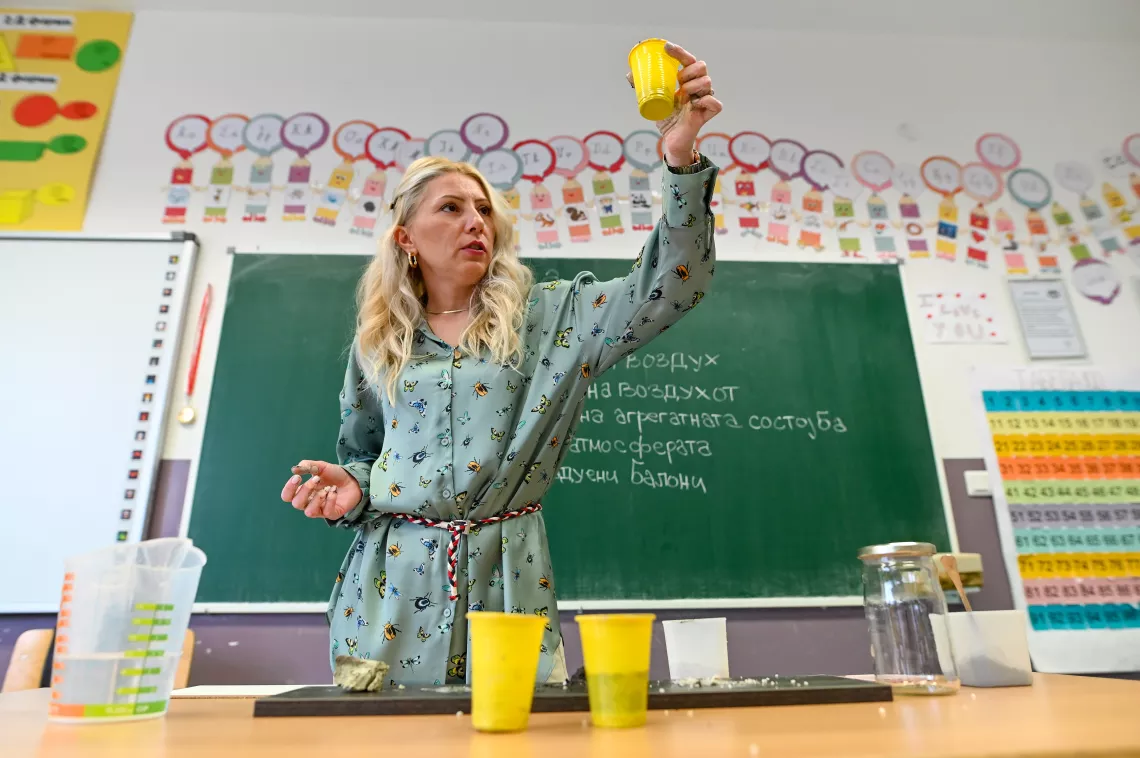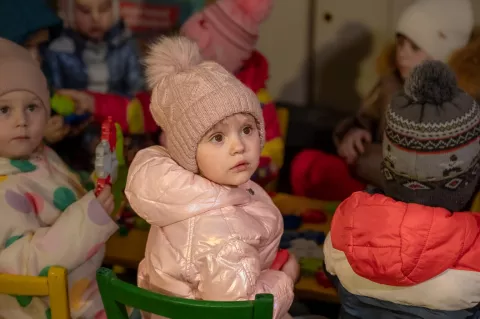Children learn about climate change and build scientific curiosity through experiments an
The experiential school activities help children develop skills such as problem-solving, perseverance and collaboration

All humans are born with curiosity, but like all traits, it needs to be stimulated otherwise can fade away. Children, especially in the early school grades, need activities that trigger curiosity, awe and interaction. In fact, active, play-based learning approaches can transform the educational experiences of children and strengthen learning motivation and outcomes. Learning complex scientific concepts through experiments can stimulate curiosity among children and build lifelong learners.
“Did you notice? Why did that happen? Does that happen in life?” teacher Biljana Arsovska poses these questions while children jump from their seats and respond all in one voice. This is what the Grade 4 science class at the “Vera Jocic” elementary school in Skopje looks like when children learn about environment and climate change through experiments, hands-on-activities and critical reflection on their experience.
“Children at this age learn by doing, they learn through their senses. Seeing and touching objects helps them come to a solution on their own. Experiential learning is the best way of learning because they retain the knowledge,” says their teacher.

Biljana Arsovska is one of the 115 teachers and educators who joined the UNICEF supported capacity building workshops on teaching about climate change through experiments.
The workshops help teachers and educators acquire knowledge on how to apply new cost-effective experiments in their classes. The approach helps children to learn the basics of science and the effects of environmental and climate change phenomena, such as degradation on water, soil, air, heat and warming cycles.

Biljana is currently sharing the knowledge learned to her colleagues as well. So far she has transferred her knowledge to 13 other teachers within her school and developed a school programme for extra-curricular activities to engage teachers and students in hands-on experiences and reflection on environment and climate change.
“Previously, we had been doing a range of environmentally oriented activities in the school, mostly in support of the behaviours necessary to protect the environment. What was missing was experiential activities to support building an understanding of the principles and processes of the environment and climate,” she said.

During the experiential activities, she noticed interesting trends in students’ behaviour. On one hand, there was a great amount of collaboration going on and children were learning from each other. On the other hand, since the students were immediately involved in the problem-solving activity, the level of ownership of the outcome was high.

“They feel proud to see the result of their effort,” says Biljana. “All students are engaged in a very same way and none of them stands out as is often the case when the “right answer” is required.”
As opposed to the traditional “right answer approach”, during the experiments all sorts of answers are possible. For example, after the teacher showed the balloon baking soda experiment, a child made a connection and recalled how bread proofed when his grandma added raising agents like baking soda.
“Their solutions to environment degradation may be radical – such as to replace the cars with chariots as a response to air pollution - but I let them think on their own,” explains Biljana.

The experiential learning also showed results in areas that the teacher did not expect. Besides giving all children the chance to explore different scientific concepts through their senses, the experience helped develop other useful skills including problem-solving, perseverance, and self-confidence.
The most unexpected benefit the teacher noticed was the increased engagement of students who are shy and students with special educational needs who are sometimes overpowered by other children.
"All children, no matter where they come from, what families they come from, meet here at school,” explains the teacher. "They receive different level of stimulation and support in their homes, and this is why we as teachers have such an important role and responsibility to provide the common starting point for all of them.”

Teaching environment and climate change through experiments and hands on activities is part of the programme “Empowering children and young people to act as change agents to reduce the vulnerability of climate change to communities” funded by Sweden and implemented by UNICEF Country Office North Macedonia.





